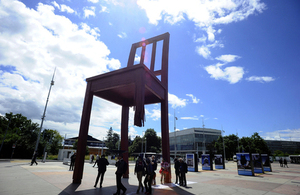UK statement at the International Organization for Migration Council
UK statement delivered on 6 December 2016.

The International Organization for Migration is headquartered in Geneva
I am delighted to speak to you on behalf of the UK and to pay tribute to the IOM and its dedicated staff on its 65th anniversary. It seems fitting that this organisation, that was born out of the need to help Governments manage the large scale displacement of people caused by the Second World War, has just been confirmed as the leading international Agency on migration through its agreement with the United Nations.
We are delighted that IOM has entered into this new relationship with the UN at a time when the need for a joined up and effective response on migration is so desperately important. We fully expect this new status to leave the IOM’s essential characteristics as an efficient, intergovernmental, non-normative Agency unchanged. Indeed we confess we are hoping that some of your responsiveness, and cost-effectiveness will set a good example for others.
It is that flexibility, responsiveness and effectiveness which has lead to a growth in the UK’s work with IOM. The UK works with IOM on issues as diverse as humanitarian protection, disaster preparedness, border management capacity building, resettlement - including of 5,000 Syrians this year - relocation and reintegration, and on counter trafficking and victim support. I’d also like to pay tribute to your work as as the joint Global Cluster lead for the Camp Coordination and Camp Management Cluster (CCLM), so crucial for those displaced in times of direst emergency.
It is this diversity and depth of expertise that we hope will have a central place in the development of the Global Compact for Safe, Regular and Orderly migration. The New York Declaration also acknowledges the importance of taking into account Geneva’s role and expertise throughout the process of developing the Global Compact. The International Organization for Migration is particularly important in this regard, as the leading international agency on migration. The UK supports the IOM playing a leading role throughout the process, ensuring that we benefit from the IOM’s policy and operational experience. The UK’s position on the modalities process is that the consultation phase must be inclusive and thorough but should use existing mechanisms, not create new ones, and reflect the Member state led nature of the overall process. IOM’s role in the International Dialogue, the High level Dialogue and of course the GFMD, will be an important part of this process.
The British Prime Minister, Theresa May, set out, in her speech to UNGA in September, three principles the UK would like included in the global migration agenda:
• First, to embed the principle of ‘first safe country’ to help reduce dangerous secondary movements, which threaten migrants’ lives and open them to exploitation.
• Second, that all states should maintain the right to control their borders and accept returns of their nationals, when they have no right to remain elsewhere.
• Third, that we must strengthen international adherence to legal frameworks that distinguish between refugees and economic migrants, so we can provide proper protection for refugees and reap the economic benefits controlled migration can bring.
The UK’s ambition is for a Compact that balances rights with responsibilities. We believe the Compact is an unprecedented opportunity to restore faith in our collective ability to manage migration and to make it work for everyone. The UK plans to play its full part in supporting the UN in making sure it is a success.